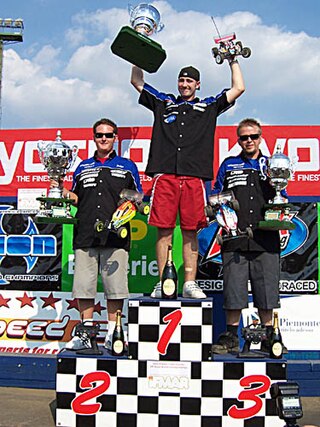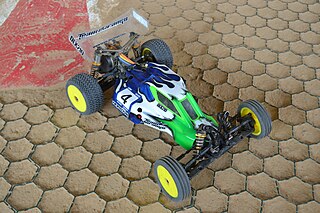Related Research Articles
Radio-controlled cars are miniature model cars, vans, buses, trucks or buggies that can be controlled from a distance using a specialized transmitter or remote. The term "RC" has been used to mean both "remote controlled" and "radio controlled"." remote controlled" includes vehicles that are controlled by radio waves, infrared waves or a physical wire connection, but the latter term is now obsolete. A common use of "RC" today usually refers only to vehicles controlled by radio, and this article focuses on radio-controlled vehicles only.

Motorsport, motorsports or autosports is a global term used to encompass the group of competitive sporting events which primarily involve the use of motorized vehicles. The terminology can also be used to describe forms of competition of two-wheeled motorised vehicles under the banner of motorcycle racing, and includes off-road racing such as motocross.

The International Federation of Model Auto Racing (IFMAR) is the world governing body of professional radio controlled car racing.
Remotely Operated Auto Racers, abbreviated as ROAR, is the sanctioning body of competitive radio-controlled car racing in the United States and Canada. It is a US national non profit organization that promotes the sport of radio controlled model car racing.
Associated Electrics, Incorporated of Lake Forest, California is one of the world's leading manufacturers of radio controlled cars, trucks and accessories. Associated Electrics is now owned by Thunder Tiger Corporation from Taiwan. The company is usually referred to as Team Associated.
Masami Hirosaka is a Japanese radio controlled car driver who is considered to be the world's most successful with a record fourteen IFMAR World Championships in 1/12 scale electric, 1/10 scale Pan, 1/10 scale 2WD off road and 1/10 scale 4WD, all electric. Hirosaka's peers have nicknamed him "Master Masami". He was considered to be one of the highest paid drivers in RC racing, until he retired from the activity. His last IFMAR race was the 2008 world championship in Thailand. His retirement ceremony was on May 3, 2009.

Slot car racing is the competitive hobby of racing with powered miniature autos which are guided by grooves or slots in the track on which they run.

The Winternats is a competitive on-road gas powered radio controlled car race attended by racers from around the world. It is held annually in Fort Myers, Florida at the Lee County Civic Center, usually in the month of February. The Winternats is one of the oldest major R/C car racing events.

Horizon Hobby, LLC. is an American international hobby product distributor, headquartered in Champaign, Illinois, United States. It currently manufactures various hobby-grade radio-controlled (RC) models, as well as Athearn model trains and die-cast models, which it sells direct to consumers as well as to hobby retailers.
The Tamiya Radio Controlled Nitro Off-road Vehicles entered the radio controlled (RC) nitro engine powered 1/8 scale truck market in July 2002. Produced by the Tamiya Corporation of Japan, these 1/8 scale trucks are designed for stadium competition. Tamiya's first nitro truck, TR-15t, was introduced in 1994. Second truck was the TGM-01 Mad Bison, released in 2000. Third attempt, Terra Crusher, departed greatly from the previous two. Terra Crusher (TGM-02), released in July 2002, capitalized on the off-road monster RC boom of the time; subsequent trucks include the Wild Commando, TNX (TGM-03), TNX 5.2R, and TRG-01 Nitrage. The trucks perform in competitions for Remotely Operated Auto Racers (ROAR) abbreviated as ROAR. ROAR is the sanctioning body of competitive radio-controlled car racing in the United States and Canada, overseen by IFMAR.

Yokomo YZ-834B "Dog Fighter" is a 1/10 scale electric-powered 4WD radio-controlled vehicle made by Yokomo. Introduced in 1983 for off-road racing, it has been cited by the website, LiveRC, as the first racing specific 4WD buggy The car was marketed in Europe, sold by Graupner, as the Graupner Dogfighter and in the US by Delta Systems, as the Delta Dogfighter.
The AAA Contest Board was the motorsports arm of the American Automobile Association. The contest board sanctioned automobile races from 1904 until 1955, establishing of Championship Car racing. Modern-day IndyCar racing traces its roots directly to these AAA events.
The IFMAR World Championship for 1:10th Electric Off-Road Cars is a world championship radio controlled car race sanctioned by the International Federation of Model Auto Racing (IFMAR). It takes place biennially on odd years since 1987 in its current format but inaugurated in 1985 as a championship for Stock and Modified class It is considered by the radio-controlled modelling industry to be the most prestigious event in the calendar that a number of mainstream hobby and toy brands have fielded factory entries.

A 1:10 radio-controlled off-road buggy is a 1:10 scale radio-controlled dune buggy designed for off-road racing. These cars are based on their full-scale equivalents that are commonly found in desert racing. The buggies are split into two race categories, two (2WD) and four-wheel drive (4WD). These can easily be distinguished visually by their wheel size at the front. Cars are typically electric powered, but nitro versions do exist but are less common because racing classes exist for electric cars. The class is inexpensive and similar to a number of other classes, and this makes them popular with newcomers. The cars are also known as 1/10 off-road.
Sanwa Denshi, widely known as Sanwa, is a brand of wireless equipment best known for its high end radio-control gear for scale modelling use. The company have been a subsidiary of the SMC Group since 1965 and began to diversify into the manufacturing of radio-control equipment in 1974 and remote control devices for home and industrial use since 1985.

The 2015 IFMAR 1:10 scale Electric Off-Road World Championships is the 16th edition of the IFMAR 1:10 Electric Off-Road World Championship for 1:10 scale radio-controlled electric off-road buggies sanctioned by the International Federation of Model Auto Racing (IFMAR). It was run over two separate classes over eight days from 3 to 10 October, with each class running for three days each in total.
2009 IFMAR 1:10 scale Electric Off-Road World Championships was the 13th running of the IFMAR 1:10 Electric Off-Road World Championship for 1:10 radio-controlled electric off-road buggies sanctioned by the International Federation of Model Auto Racing (IFMAR) that ran over two separate classes.
Jared Randall Tebo is an American radio-controlled car racer from Raymore, Missouri who specializes in off-road racing driving for Mayako.
Clifton Bradley Lett is an American retired radio-controlled racer and former president of Associated Electrics, where he began his R/C career in 1985. A former motorcross mechanic for Yamaha, he won seven ROAR National Championships, three NORRCA National Championships and the 1991 IFMAR World Championship and was one of the foremost drivers of the 1980s. Lett, known as "the Buggymaster", helped refine the Associated RC10 and other models in the range. He was the first driver to exceed 100 miles per hour (160 km/h) with a radio-controlled car, recorded by Guinness World Records at 111 miles per hour (179 km/h) in 2001.
The 1997 IFMAR 1:10 Electric Off-Road World Championship was the 7th edition of the biennial IFMAR 1:10 Electric Off-Road World Championship for 1:10 scale radio-controlled electric off-road buggies sanctioned by the International Federation of Model Auto Racing (IFMAR) to be run over two classes over seven days between 9 and 16 August 1997 with each class ran for three days.
References
- 1 2 "For These Racecars, It's 50 Laps Around the Living Room". The New York Times . 25 April 2002. Retrieved 3 January 2016.
- 1 2 Shelby, R (2013). Getting Started In the RC Car Hobby. Lulu. ISBN 9781304552471.
- ↑ Sanders, Jack (1999). The Internet Outdoor Family Fun Yellow Pages: The Online Guide to the Best Outdoor Family Sites . Ragged Mountain Press/McGraw-Hill. p. 217. ISBN 9780071347334.
- ↑ "Burning Rubber by Remote Control: Radio cars are enjoying a resurgence, among novices and experts alike. The high-tech hobby has a strong following in the Valley". Los Angeles Times . 10 June 1994. Retrieved 3 January 2016.
- 1 2 Filip M. Gieszczykiewicz. "FAQ for R/C electric off-road racing". Archived from the original on 4 March 2016. Retrieved 3 January 2016.
- ↑ A Beginner's Guide to Buying and Racing Radio Control (RC) Cars (PDF).